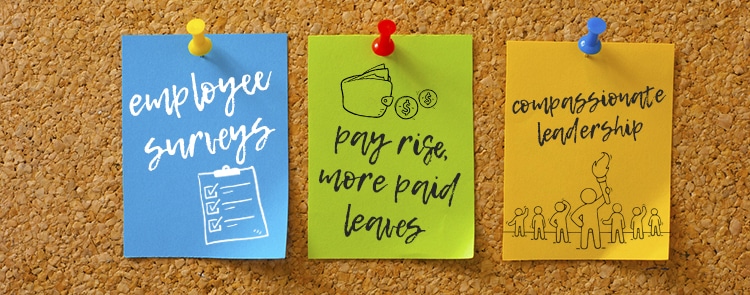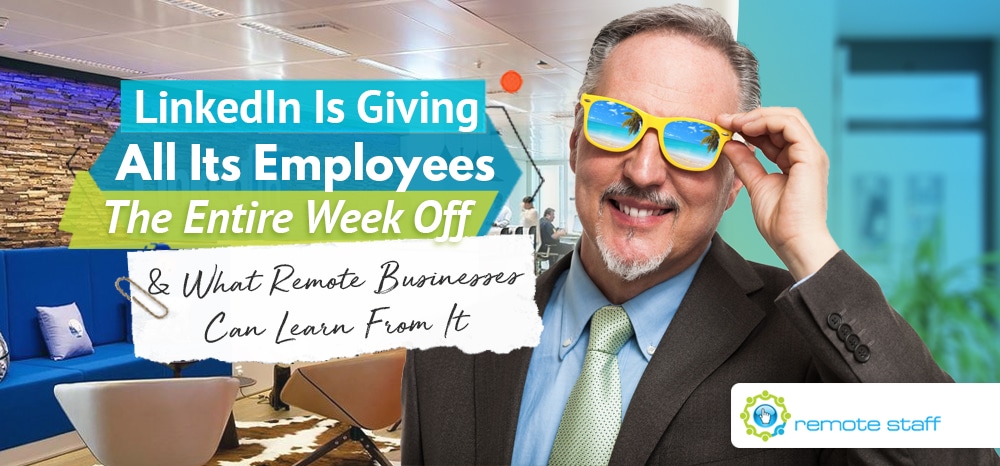Yep, you read that right.
The professional networking giant is giving its employees the whole week off starting 5 April.
Why? It’s simple. The company seeks to give its full-time employees time to unplug and to avoid burning out.
“We wanted to make sure we could give them something really valuable.”

That’s how Teuila Hanson, LinkedIn’s chief people officer, began her statement about the unprecedented company-wide leave. “What we think is most valuable right now is time for all of us to collectively walk away,” Hanson said. “You want the goodness of your vacation to last a little bit when you come back.”
Majority of the company’s 15,900 employees will be on paid leave this week. In the meantime, a core team will keep the business running, although they’ll be able to schedule time off for themselves later.
This means that the ones on leave won’t have emails, meeting notes, and project requests piling up in their absence.
A well-deserved reward

Why the company-wide leave? LinkedIn’s executives came up with the idea after going over the results of their latest employee survey. The survey, which is held every quarter, features one open-ended question: How are you?
While the United States’ vaccine roll-out was off to a good start, there were clear signs of burnout among LinkedIn’s employees. Many of them felt isolated, struggled with maintaining clear boundaries between work and family, and so on.
The company did launch a proactive response to the feedback. These included workshops that tackled topics like the importance of saying “no” and compassionate accountability programs. “No meeting days” also enabled people to lock in instead of running from one Zoom meeting to another.
However, it wanted to take things a step further. Realising how many workers felt energised after the company’s annual December leave, LinkedIn decided to provide another week of paid leave. Apart from being a way to enable employees to address burnout and self-care, it also allowed the company to show gratitude to its workforce.
“We heard after our December shutdown that people felt energized, they felt like they were able to get outside, and felt able to do things like read books, watch webinars and watch movies. We thought, does it make sense for us to provide another paid week off, not only to address burnout and self care, but also show our gratitude to our employees? Because they are working hard, they are showing up and they are doing extraordinary work for us at LinkedIn,” Hanson said.
Takeaways for Remote Businesses

Of course, not everyone can follow suit. Remote companies that need to keep serving its customers’ needs in order to survive, for instance, can’t just up and leave for a week like LinkedIn did.
This doesn’t mean that they can’t learn a thing or two from the professional networking giant’s unprecedented move, however.
For starters, regular employee surveys are a great practice to adapt. Remote working can feel isolating because we don’t see our colleagues and workers face to face. Thus, we can’t rely on non-verbal cues like body language and facial expressions to gauge the overall mood in the workplace.
Periodic surveys with carefully formulated questions can help employers get a more accurate gauge of how their team REALLY feels at the moment. Then, they can begin to figure out how to address any underlying issues and nip them in the bud.
Happy workers make for productive and loyal workers, after all.
Secondly, while it’s good to reward employees for their hard work, giving the right reward is equally important. Taking time to consider whether your employees could use a pay rise, more paid leaves, or even just a few words of appreciation AND when to give out such can go a long way.
Lastly, there has never been a greater need for compassionate leadership. Many remote workers come from developing countries that are ill-equipped to deal with catastrophes like a global pandemic. Therefore, a bit of empathy for what they might be going through always helps when crafting employee-friendly policies.
For more news and updates on developments in the remote working industry, as well as tips for how to facilitate an effective and harmonious remote working environment, follow our blog on Remote Staff AU.
Serena has been working remotely and writing content for the better part of the last decade. To date, she's written for Pepper.ph and Mabuhay Magazine, among others, and has churned out more than a thousand articles on everything from The Basics of Stock Market Investing to How to Make Milk Tea-Flavored Taho at home. Hermits, aspiring hermits, and non-hermits with interesting project propositions may email her at serena.estrella10@gmail.com.
























 Zero Recruitment Fee
Zero Recruitment Fee